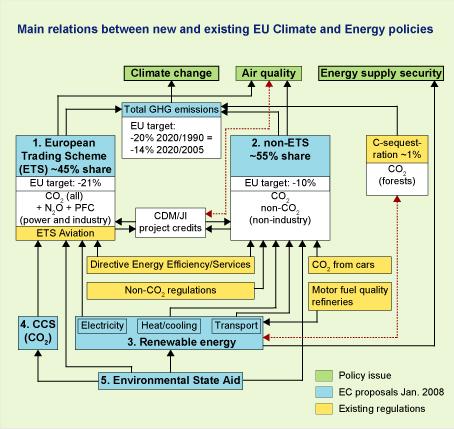Consequences of the European Policy Package on Climate and Energy. Initial assessment of the consequences for the Netherlands and other Member States
National targets for the reduction of greenhouse gas emissions will become less important when the proposals by the European Commission on Climate and Energy, released earlier this year, will be approved by the European Parliament and the European Council. The proposals shift more of the responsibility for climate policy to the European level: after 2012 national caps for greenhouse gas emissions will partly become defunct. In addition, opportunities for trading ‘Guarantees of Origin’ will increase to meet targets for renewable energy sources.
Responsibility greenhouse gas emissions of Member States shifts to European level
This report presents a description and an initial assessment of the legislative proposals regarding Energy and Climate Change which the European Commission launched in one package at 23 January 2008 (see figure). This package included proposals to amend the EU Emissions Trading Directive (ETS), to share the effort of reducing green house gases not covered by the ETS, and to promote renewable energy.
An initial estimate is also presented of the extent to which the Commission’s proposals are sufficient to meet the GHG emission reduction targets and energy targets presented in the Netherlands 'Schoon en Zuinig' policy plan (Clean and Efficient). Finally, outstanding issues for further analysis are identified.

Targets of ‘Clean and Efficient’ policy plan
The report assesses the proposals in relation to each other and also provides an initial estimate of the extent to which the European proposals are sufficient to achieve the Netherlands greenhouse gas emissions reduction targets and energy targets in the Dutch ‘Schoon en Zuinig’ policy plan (‘Clean and Efficient’). Finally the report identifies outstanding issues for further analysis.
Conclusions
Main conclusions are:
- The Commission’s policy package on Climate and Energy delivers the framework for EU-wide implementation of the decision of the European Council in March 2007 to achieve at least a 20% reduction of GHG emissions by 2020 compared to 1990. The responsibility for the implementation is shared between the Commission and the Member States. The proposals move more of the responsibility for European climate policy to the European level.
- The proposals provide more flexibility to reach targets: national caps for GHG emissions disappear and there will be more trade in emission allowances under the European Union’s Emission Trading System (EU ETS). In addition, there will be trade in emission allowances through CDM/JI and ‘Guarantees of Origin’ of renewable energy resources.
- The Netherlands 'Schoon en Zuinig' policy plan (which includes a 30% reduction in GHG emissions in 2020 compared to 1990) will profit from the Climate and Energy package. However, the national target for the emissions from the industry and energy sectors has lost its significance. The Netherlands Government can consider reformulating the national target for total GHG emissions.
- The targets set in 'Schoon en Zuinig' for 2020 for the sectors not covered by the EU-ETS and for renewable energy remain within reach with the purchase of emission credits and ‘Guarantees of Origin’ of renewable energy resources. For achieving the 'Schoon en Zuinig' target for energy efficiency, strict EU policies in other areas, such as standards for vehicles and electric appliances, are necessary. Such additional EU policies are also necessary for achieving the Netherlands targets in event the EU decides on a 30% overall reduction of GHG emissions.
- In a perfect market for emission rights, there will be a waterbed effect. The market ensures that emissions will be more or less equal to the cap of the EU-ETS. Additional national policy measures are not effective for climate targets, but can be important in achieving national targets in air quality, renewable energy, energy efficiency or technology development.
Authors
Specifications
- Publication title
- Consequences of the European Policy Package on Climate and Energy. Initial assessment of the consequences for the Netherlands and other Member States
- Publication date
- 14 May 2008
- Publication type
- Publication
- Publication language
- English
- Product number
- 11